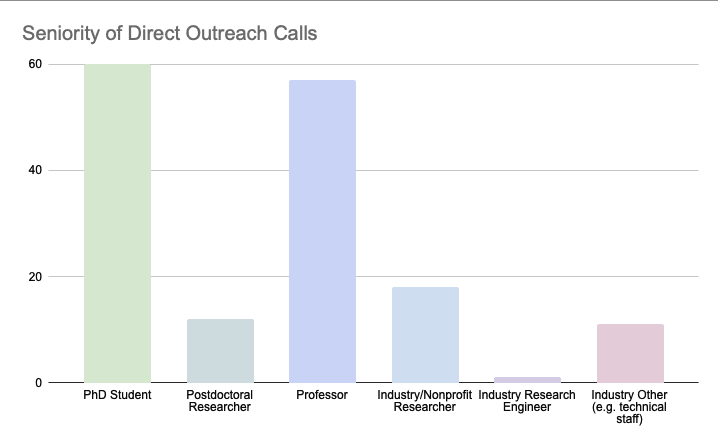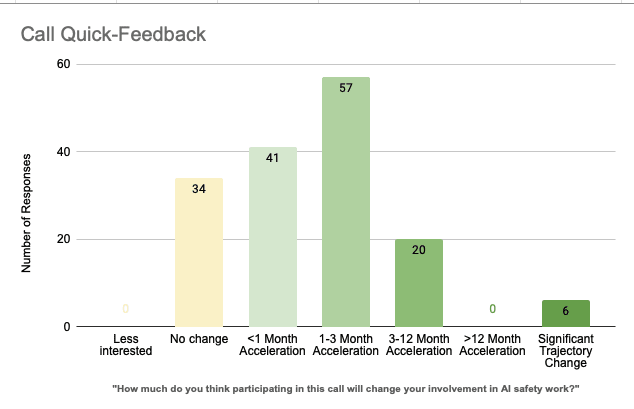Summary
Arkose is an early-stage AI safety fieldbuilding nonprofit focused on accelerating the involvement of experienced machine learning professionals in technical AI safety research through direct outreach, one-on-one calls, and public resources.
Between December 2023 and June 2025, we had one-on-one calls with 311 such professionals. 78% of those professionals said their initial call accelerated their involvement in AI safety[1].
Unfortunately, we’re closing due to a lack of funding. We remain excited about other attempts at direct outreach to this population, and think the right team could have impact here.
Why are we closing?
Over the past year, we’ve applied for funding from all of the major funders interested in AI safety fieldbuilding work, and several minor funders. Rather than try to massively change what we're doing to appeal to funders, with a short funding runway and little to no feedback, we’re choosing to close down and pursue other options.
What were we doing? Why?
- Calls: we ran 1:1 calls with mid-career machine learning professionals. Calls lasted an average of 37 minutes (range: 10-79), and we had a single call with 96% of professionals we spoke with (i.e. only 4% had a second or third call with us). On call, we focused on:
- Introducing existential and catastrophic risks from AI
- Discussing research directions in this field, and relating them to the professional’s areas of expertise.
- Discussing specific opportunities to get involved (e.g. funding, jobs, upskilling), especially ones that would be a good fit for the individual.
- Giving feedback on their existing plans to get involved in AI safety (if they have them).
- Connecting with advisors to support their next steps in AI safety, if appropriate (see below).
- Supportive Activities:
- Accountability: after calls, we offered an accountability program where participants set goals for next steps, and we check in with them. 114 call participants set goals for check-in.
- Advisors: we maintained a list of 41 experts in AI safety, who we introduce to call participants when there’s a clear fit of research interests.
- Outreach: we reached out to 200-500 ML professionals from our database each week to invite them to book a call, with a 2.3% overall response rate.
- Website: We maintain a list of top AI safety papers (curated with help from our advisors), a list of top opportunities to get involved in AI safety (e.g. jobs, funding, upskilling), and a database of researchers (especially professors) interested in AI safety, with information on whether they are looking for postdoctoral researchers or PhD students. We expect these resources to remain available, though they will be updated less frequently.
As mentioned above, 52% of call participants give feedback immediately after their initial call with us:
179 of our calls were sourced from direct email outreach to authors of work accepted to NeurIPS, ICML, or ICLR, filtered to those most likely to benefit from a call:

What do we think about other people doing similar things?
We remain excited about this kind of outreach, though we think there are risks here. If you’re considering setting up a project of this type, you’re very welcome to reach out to Victoria at victoria@arkose.org.
- ^
Of 52% who gave feedback immediately after their initial call with Arkose


I'm curious if you tracked career changes and/or relevant researched published by the people you had calls with over time?
Good question! We're choosing to be cautious around data privacy, which unfortunately makes it hard to share specific wins publicly. However, we can share this graph which people fill out six months after their call:
This is a shame to hear. Do you have any thoughts on why this wasn't appealing to funders despite the positive feedback/survey results?
Unfortunately, we got very little feedback from funders, and frequently none at all. It could be the risks of reaching out to this more senior audience (i.e. the risk of making them less interested in AI safety if the outreach is poor), but this is just a guess. I expect there are a number of factors at play.
I don't think there are other orgs filling Arkose's niche and the data I've seen suggests Arkose was doing a good job. I know funders have good reasons for not sharing their takes on every grant rejection, but it's a shame there isn't more insight into this.
Really sorry to hear that, Arkose seemed such a promising and neglected initiative! I wish you all the best.